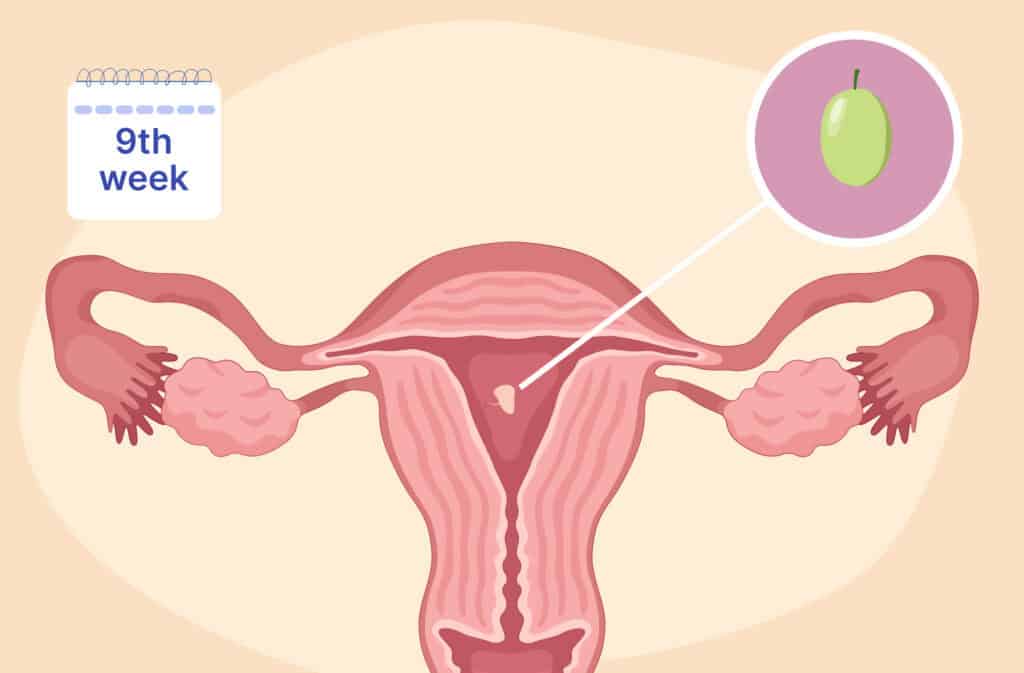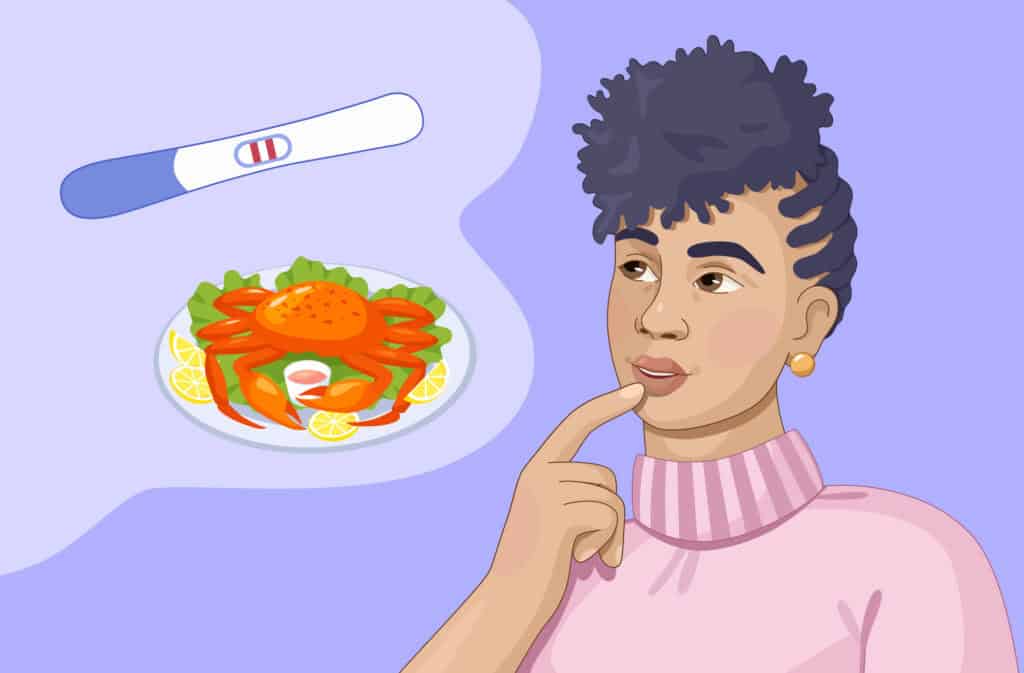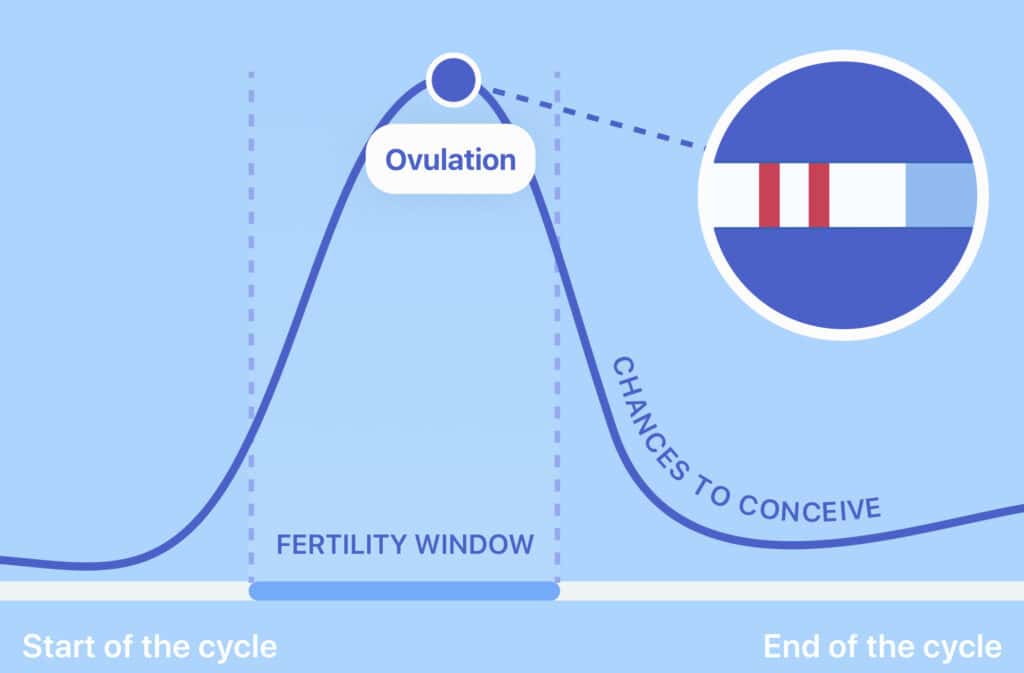Femia > Health Library > Pregnancy > Pregnancy week by week > Exploring week 9: What’s happening with your baby and what symptoms you might feel
Exploring week 9: What’s happening with your baby and what symptoms you might feel

- Updated Feb 11, 2025
- Published
CRAFTED BY HUMAN
Crafted by human At Femia, we provide accurate and up-to-date information at every stage of your journey, from trying to conceive, pregnancy and postnatal support. All content is created by a real person based on in-depth research and own professional experience. Femia ensures that you will receive expert advice, strict accuracy and a personalized approach from our authors/medical experts. Learn more about our editorial policy.
FACT CHECKED
Fact checked At Femia Health, we maintain the highest standards of editorial excellence in delivering content focused on helping you conceive, guiding you through pregnancy, and supporting you postpartum. Explore our content review principles to learn how we ensure the accuracy and quality of our health and lifestyle tips for every stage of your journey.
At 9 weeks pregnant, your baby’s major organs are forming, and they’re beginning to move—though you won’t feel it yet. Common symptoms include fatigue, nausea, and increased hunger, all signs that your body is working to support your growing baby.
You’re 9 weeks pregnant, and your baby is going through some exciting developments! While your baby is growing fast, you might be feeling new or intensified pregnancy symptoms as your body works hard to support this growth. An ultrasound at 9 weeks can offer an incredible view of your baby’s development, and some may even see tiny movements! As you move further into the first trimester, this guide will walk you through what to expect, how your body is changing, and tips to make this week as smooth as possible.
Femia decodes your body’s signals and helps you track progress effortlessly
9-week pregnancy symptoms
As pregnancy hormones continue to rise, you may experience a range of symptoms. Here are the most common signs at week 9:
- Morning sickness: Nausea may still be present, particularly in the mornings, though it can affect you at any time of day.
- Fatigue: Your body is working hard, leading to increased tiredness. Rest when you need to and allow your body time to recharge.
- Increased hunger: As your metabolism rises, you may feel hungry more often. Eating nutrient-dense snacks can help you maintain energy.
- Mood swings: Hormone fluctuations can make emotions feel heightened, so mood swings are common.
- Breast changes: Breasts may feel tender, fuller, or even a bit sore as they continue to prepare for breastfeeding.
Using a pregnancy app can help you track these changes and stay informed about your body’s efforts to support your growing baby.
👉Find out more: 8 Weeks pregnant: Symptoms, growth & baby’s development
Your body at 9 weeks pregnant
At 9 weeks, your body is adapting to support your growing baby. Blood volume has increased significantly, which is why you may feel fatigued or occasionally dizzy. Hormone levels are at a high point, supporting the development of the placenta, which will fully take over the role of nourishing your baby in the coming weeks. This week, it’s essential to listen to your body, rest as needed, and focus on balanced nutrition.
9-week pregnant belly
Most women won’t notice a visible belly bump at 9 weeks, although some may feel bloated due to hormone-related fluid retention. The uterus is growing but still within the pelvic area, which means any bump is likely to appear in the coming weeks.
Baby development at 9 weeks pregnancy
At 9 weeks, the baby’s organs are forming, and tiny muscles are starting to develop, enabling small movements. Facial features are becoming more defined, and the eyes are now covered with thin eyelids. The digestive system and reproductive organs are also beginning to form. While still tiny, your baby has completed many of the foundational structures they’ll need for the coming months of growth.
9-week fetus size
The 9-week fetus size is about 0.9 inches (roughly the size of a grape) and weighs around 0.07 ounces. Though small, rapid growth is taking place, and the baby’s structure is now visibly human-like on an ultrasound.
9-week ultrasound
An ultrasound at 9 weeks can reveal significant details, including a defined head, torso, and the beginnings of arms and legs. Some providers offer 9-week ultrasound 3D imaging that can show detailed views of the baby’s developing features, although this may vary by location. A heartbeat is usually detectable, which is reassuring for many parents.
Real life 9-week fetus
A real 9-week fetus is tiny yet intricate, with small limbs, fingers, and toes beginning to separate. The heart has formed four chambers, and the brain is developing complex structures. Though you can’t feel it yet, your baby is beginning to make small, spontaneous movements.
👉Find out more:
Reaching double digits: What to expect at 10 weeks pregnant
What’s happening at 11 weeks pregnant: Baby size, development, and self-care
Health tips and self-care at 9 weeks pregnant
- Listen to your hunger cues: Increased hunger is common, so focus on nutrient-dense snacks like fruits, nuts, yogurt, and whole grains to keep energy levels stable.
- Stay hydrated: Hormonal changes can lead to dehydration, so aim to drink plenty of water throughout the day.
- Rest when you need to: Fatigue is normal; taking naps or going to bed earlier can help you manage.
- Take prenatal vitamins: Continue taking prenatal vitamins, as nutrients like folic acid are crucial for your baby’s development at this stage.
Femia decodes your body’s signals and helps you track progress effortlessly
Questions from the Femia community
Is it true I should do Kegel exercises in pregnancy?
Yes, Kegel exercises can help strengthen pelvic floor muscles, which support your bladder, uterus, and bowels. They can be beneficial throughout pregnancy and aid in recovery post-birth.
I'm hungry all the time, what should I do?
It’s normal to feel hungrier during pregnancy. Focus on eating small, balanced meals with lean proteins, healthy fats, and fiber-rich foods to keep you feeling full and energized.
What support routine should I have at week 9?
Focus on balanced nutrition, light exercise, hydration, and rest. Setting up a support network with friends, family, or other expectant mothers can also be valuable.
The bottom line
At 9 weeks pregnant, your baby is making rapid developmental strides, with key organs and features taking shape. You may feel more intense symptoms as your body adjusts to these changes, but taking care of your nutritional and rest needs can support you through this time. Embrace the growth, and remember that you’re entering a crucial stage for your baby’s development.
References
- “9 Weeks Pregnant: Symptoms, Baby Development & Tips.” BabyCenter, www.babycenter.com/pregnancy/week-by-week/9-weeks-pregnant.
- “Week 9 of Pregnancy: Symptoms, Baby Development & More.” What to Expect, www.whattoexpect.com/pregnancy/week-by-week/week-9.aspx.
- “9 Weeks Pregnant: Baby Development, Symptoms & Tips.” NHS, www.nhs.uk/pregnancy/week-by-week/1-to-12/9-weeks/.
- “Pregnancy Week 9: What to Expect.” American Pregnancy Association, www.americanpregnancy.org/healthy-pregnancy/week-by-week/9-weeks-pregnant/.

Wondering if you can eat crab while pregnant? Discover if crab and crab legs are safe to eat during pregnancy, along with tips for enjoying seafood safely.

Luteinizing hormone (LH) triggers ovulation within 24-36 hours of LH peak. Find out how long after an LH surge do you ovulate to boost your chance of conceiving.

Explore the causes and timing of fatigue during the first trimester of pregnancy, including when it peaks and how to manage it. Discover practical tips for coping with exhaustion during this challenging time.

